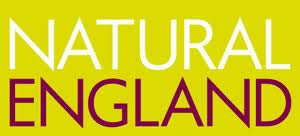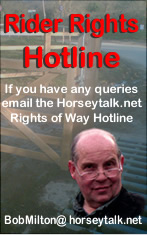
Horseytalk.net/Hoofbeat EXCLUSIVE
RIDER RIGHTS

Natural England have just reviewed the way they approach their access and engagement work.
This is a summary of their new Access & Engagement Strategy
 We have reviewed the way we approach our access and engagement work in light of the current policy and financial context, as well as our general purpose and specific statutory duties. Our review has taken account of the localism agenda and the generic role that the Government wants public bodies like Natural England to play in relation to civil society. And itís taken account of the commitments set out in the Natural Environment White Paper and the England Biodiversity Strategy, with their shared emphasis on reconnecting people with nature.
We have reviewed the way we approach our access and engagement work in light of the current policy and financial context, as well as our general purpose and specific statutory duties. Our review has taken account of the localism agenda and the generic role that the Government wants public bodies like Natural England to play in relation to civil society. And itís taken account of the commitments set out in the Natural Environment White Paper and the England Biodiversity Strategy, with their shared emphasis on reconnecting people with nature.
Our Access and Engagement Strategy has a timescale of 2020 and is a strategy for Natural England as a whole, rather than just for our Access & Engagement Function. It uncouples access and engagement for the purposes of implementation - although not necessarily for the purposes of organisational structure.
Access is about facilities (paths, access land, sites and local greenspace), as well as information and promotion. The national Monitor of Engagement with the Natural Environment (MENE) survey we have undertaken with Defra and the Forestry Commission highlights the importance of access to many millions of people.
In England, we now have a good range of access facilities, at least for walkers. We see the main challenges and opportunities as:
- safeguarding existing access facilities in light of public spending cuts and identifying alternative resources for both maintenance and improvement;
- improving access to quality greenspace for the poorest urban communities;
- making existing access facilities more widely available by removing unnecessary obstacles;
- improving provision for riders and cyclists; and
- integrating access with conservation management more consistently and effectively.
There is also a continuing challenge to maximise the benefits to society of statutory access rights, for example by improving the system for recording unrecorded rights of way (the recommendations of the Stakeholder Working Group we set up to find the best way forward on this issue are now with the Government), by improving the cost-effectiveness of CROW Act administration, and by making better use of the dedication powers introduced by that Act.
Engagement is about engendering Ė among individuals and communities - an understanding of the natural environment and an appreciation of its value and relevance, leading to a sense of ownership, empowerment and commitment. Engagement needs to be part of all our work; it includes, but isnít limited to, democratic participation.
Engaging people with the natural environment is one of the big challenges of our time. Itís a challenge for both Government and the environmental sector as a whole, and requires a consistent approach and language that isnít currently in place. The concept of benefits to society from ecosystem services will be our starting point, and we will seek sensible and achievable ways of integrating public engagement into everything we do.
Our role
Our role across both access and engagement will include:
- acting as a national champion and focal point for the environmental sector, in accordance with the wishes of our stakeholders;
- providing policy and technical advice to Government, and supporting the development and implementation of policy;
- translating Government policy into strategic direction and standards; and
- co-ordinating, disseminating and publicising the evidence base.
The activities we undertake will be focused on achieving medium and long term outcomes which deliver public benefits. Any short-term activities we undertake will normally be experiments and pilots to develop ways of making a significant long-term difference. And we will work closely with other Defra network bodies to ensure that our activities are mutually complementary.
Our access role will also include:
- fulfilling our open and coastal access statutory duties as cost-effectively and consensually as possible;
- maintaining strategic leadership for National Trails by securing the quality of both the resource and the user experience, while supporting a more devolved and locally responsive delivery model;
- developing effective mechanisms for supporting communities of interest and locality (including but not limited to Local Access Forums) to safeguard, improve and promote access opportunities;
- working with stakeholders to find ways of improving the efficiency and effectiveness of access provision and management; and
- improving the integration of access outcomes into the rest of our work.
Our engagement role will also include:
- treating engagement as a long-term and integral part of all our work, by tailoring engagement opportunities to the nature and scale of each of our activities; and
- using our NNR estate to engage people across the breadth of our activity and to demonstrate an integrated approach to delivery.
We will offer to lead the Defra network in developing a more cohesive approach to engaging people in the natural environment, based on the ecosystem services model, and we will of course reflect that approach in our own work.
We wonít limit our engagement to any particular sectors of society, but engaging with local communities about work affecting their localities and engaging more generally with schools and families will always be among our highest priorities, as will offering opportunities for hands-on participation through volunteering.
Any focus on hard to reach sectors of society will be with the aim of developing, and then sharing more widely, techniques for engaging those sectors, rather than taking on a long-term delivery role which we are unlikely to have the resources to see through.
We will work with partner organisations to ensure that our engagement activities complement, rather than compete with, theirs.
Our USP is to be the governmental champion for access to, and engagement with, the natural environment; to innovate integrated and broadly supported solutions; and (where necessary, as in the case of open access administration) to act as an impartial national regulator.
Our delivery models
The main strands of our refreshed delivery models for access and engagement will be:
- a focused and strengthened evidence capability across Natural England and partners;
- a stakeholder engagement capability in place nationally and locally, and clearly setting out the nature (and limitations) of our offer;
- a strengthened advice capability, whose core will be web-based toolkits comprising evidence, information about the national framework of legislation and policy, and advice Ė supplemented by hands-on support in some priority areas where resources are available; and
- a reduced direct delivery capability, focused on those access duties where direct delivery is required by statute or for reasons of maintaining a nationally consistent approach, and on the management of our own NNR estate.







